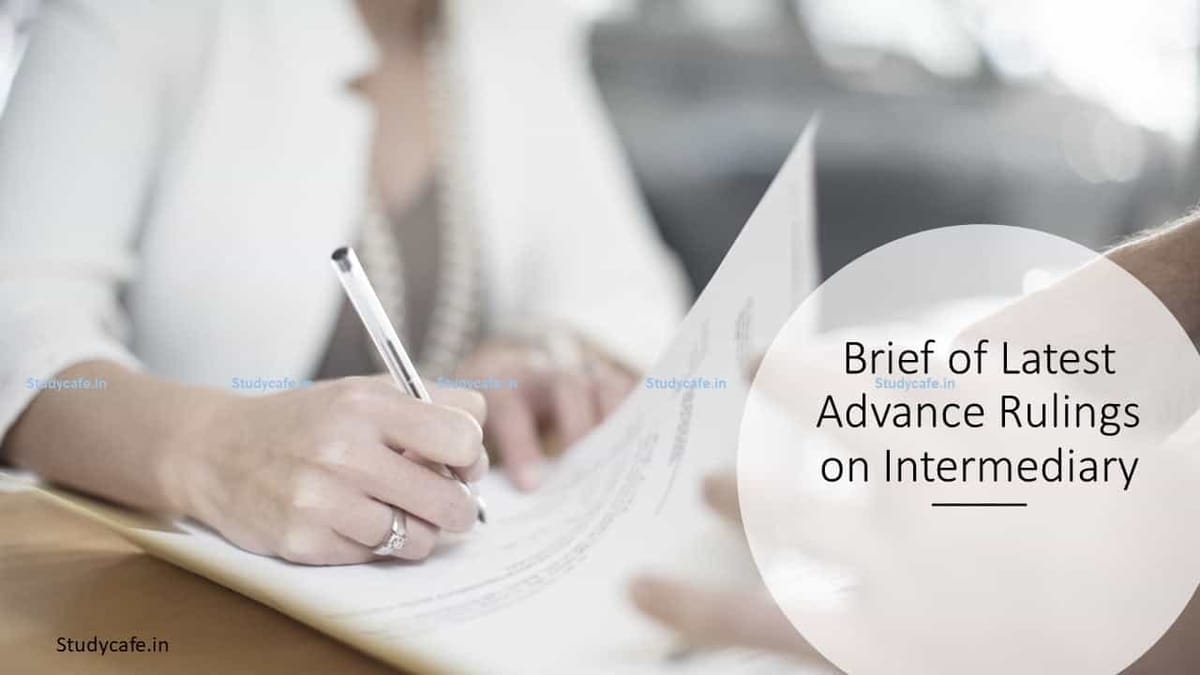CA Rajender Arora | Jul 14, 2021 |

Brief of Latest advance rulings on Intermediary
1. Where a subsidiary company entered into agreement with its holding company for providing procurement operations (PO) will be fall in definition of ‘Intermediary’ as per section 2(13) of IGST Act, 2017
(AUTHORITY FOR ADVANCE RULINGS, KARNATAKA- In re, Airbus Group India (P.) Ltd.) (01-07-2021)
Where a subsidiary company entered into agreement with its holding company for providing procurement operations (PO) function and procurement transformation & central services (PY) function, since subsidiary company plays an important part in identifying vendors, making them understand product requirement, advising and guiding them not merely on technical aspect of product but also ethical aspect in relation to such activities, without which, holding company will not be able to procure goods from vendors, instant activity is nothing but facilitating supplies to them from India and, therefore, activities performed by applicant are fulfilling parameters mentioned in definition of ‘Intermediary’ as per section 2(13) of IGST Act, 2017.
Thus, Services of applicant are covered under intermediary services and place of supply is India in terms of section 13(8) of IGST Act, 2017, activities of applicant are eligible to GST at rate of 18 per cent in terms of clause (iii) of entry No. 23 of Notification No. 11/2017 – Central Tax (Rate), dated 28-6-2017.
2. Services of the applicant by way of arranging or facilitating sales of goods for various overseas suppliers, same not being done on his own account, therefore same will be considered as ‘Intermediary Service’ instead of ‘export of service’
(AUTHORITY FOR ADVANCE RULINGS, WEST BENGAL – In re, Teretex Trading (P.) Ltd.) (28-06-2021)
The modus operandi of the business activities to be undertaken briefly summarised as under:
(i) To locate prospective overseas/Indian buyers and know their requirement of goods;
(ii) To arrange sales of the said goods from the foreign manufacturers/ traders to the prospective buyers;
(iii) Goods are delivered to the buyers directly by the suppliers located outside the country;
(iv) No prior agreement is made by the applicant with the overseas manufacturers/traders for arranging such sales;
(v) The applicant receives consideration in the form of commission in convertible foreign exchange from the overseas suppliers.
According to the modus operandi of the business, we find that the supplier of service i.e., the applicant is located in India and the recipient of the service i.e., the overseas supplier of goods to whom the applicant provides services is located outside India. However, the nature of activities going to be undertaken towards arranging or facilitating supply of goods envisages the services closely akin to the services provided by an ‘intermediary’ as defined in clause (13) of section 2 of the IGST Act, 2017.
The term ‘intermediary’ has been defined in clause (13) of section 2of the IGST as under:
“intermediary” means a broker, an agent or any other person, by whatever name called, who arranges or facilitates the supply of goods or services or both, or securities, between two or more persons, but does not include a person who supplies such goods or services or both or securities on his own account.
Therefore, services of the applicant by way of arranging sales of goods shall not be considered as ‘export of service’ as defined under clause (6) of section 2 of the IGST Act, 2017.
The author can be reached at Gstrajender@ca-spark.com
In case of any Doubt regarding Membership you can mail us at contact@studycafe.in
Join Studycafe's WhatsApp Group or Telegram Channel for Latest Updates on Government Job, Sarkari Naukri, Private Jobs, Income Tax, GST, Companies Act, Judgements and CA, CS, ICWA, and MUCH MORE!"